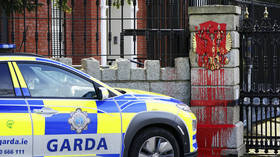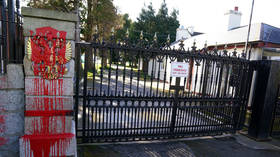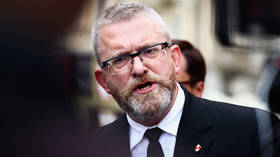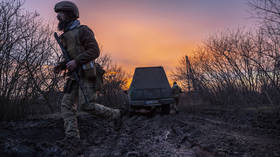Russia requests apologies and payment from Dublin

Moscow has called on Ireland to apologize for the incident with a truck that rammed the front gates of the Russian diplomatic mission in Dublin, and requested “full compensation” for the damage caused.
On Monday, police in Dublin arrested a man who backed a truck through the gate of the Russian embassy. The man reportedly told onlookers that he had “done his bit” to protest Russia’s military offensive in Ukraine. On Tuesday, the Russian Foreign Ministry summoned Irish Ambassador to Moscow Brian McElduff to declare a “strong protest” to him over the incident.
“We emphasized that the demonstrators, who surrounded our Embassy, adopted, in fact, the tactics widely used by terrorists. We emphasized the unacceptability of the clear lack of action from the law enforcement agencies in Ireland when such acts are committed in the presence of policemen,” the Ministry said in a statement.
Moscow also requested the Irish authorities to urgently take “comprehensive measures” to ensure the security of the Russian embassy in Dublin and its staff “in accordance with the 1961 Vienna convention on diplomatic relations.”
The Foreign Ministry revealed that it “demanded from the leadership of Ireland an official apology for what had happened and full compensation for the damage caused.”
Russia expects the Irish authorities “to conduct an objective investigation and punish the perpetrators,” the statement says.
Following the launch of Moscow’s military offensive in Ukraine on February 24, the embassy in Dublin, as well as some other Russian diplomatic missions, have been subjected to vandalism and threats.
The Russian ambassador to Ireland, Yuri Filatov, claims that Ireland has been at the forefront of “anti-Russian events” in the EU, and criticized the coverage of the conflict in Ukraine by the Irish media.
Moscow explained its attack on Ukraine as an urgent need to “demilitarize” the country, to protect the Donbass and Russia’s own security. Western nations, however, including Ireland, responded by imposing restrictions on the Russian economy.













